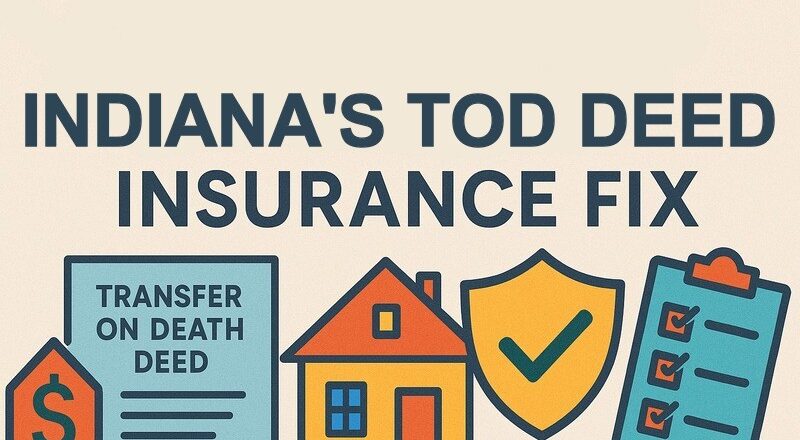In previous articles I have written about the use of Transfer on Death (TOD) Deeds in Indiana and the pros and cons of their use in Indiana. A significant new law in Indiana, effective July 1, 2025, addresses a critical gap in property insurance coverage following the death of a real property owner, especially concerning properties transferred via Transfer on Death (TOD) Deeds. This legislation comes as a direct response to issues highlighted by cases in other States, like the infamous Minnesota incident where a house burned down just six days after the owner’s death, and the court ruled that no insurance coverage existed because the title had immediately transferred to the beneficiary, who was not a named insured.
TOD Deeds have gained popularity as an efficient estate planning tool, allowing property owners to name a beneficiary who will automatically receive the real estate upon the owner’s death, bypassing the often lengthy and costly probate process. This avoids the need for complex trusts or extensive attorney fees, making it an attractive option for many. However, as the Minnesota case starkly illustrated, this immediate transfer of title could inadvertently terminate existing insurance coverage, leaving the new owner vulnerable to devastating financial losses if a catastrophe occurred shortly after the original owner’s passing.
The new Indiana law, now codified in IC 27–1‑13–18, seeks to rectify this problem by providing a vital safety net. Under the new provisions, when real property is transferred via a TOD Deed, the beneficiary will automatically be considered an insured under the deceased owner’s existing property and casualty insurance policy. This extended coverage provides a crucial buffer period, allowing the new owner time to secure their own insurance.
The default duration for this extended coverage is 60 days following the owner’s death. However, there’s a practical adjustment: if the deceased owner’s policy is set to expire less than 60 days after their death, the coverage will continue for either 30 days or until the policy’s expiration date, whichever is later. This ensures a minimum of 30 days of coverage even for policies nearing their end.
This forward-thinking legislation aims to protect beneficiaries from unforeseen circumstances, acknowledging the immediate practical challenges that arise with property ownership changes after death. It provides a much-needed layer of security, ensuring that the benefits of using a TOD Deed are not undermined by an unexpected lapse in insurance protection.

